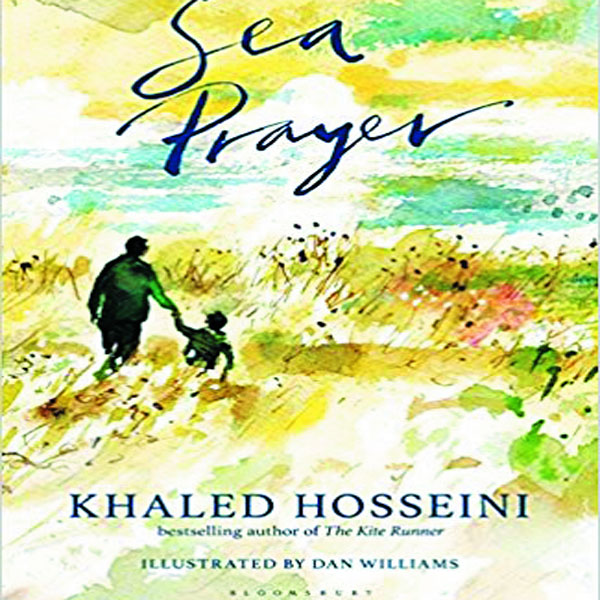Sea Prayer
Author- Khaled Hosseini
Publisher - Bloomsbury, Rs 499
Inspired by the painful story of a three-year-old Syrian refugee, who drowned in the Mediterranean Sea, Khaled Hosseini’s Sea Prayer is a soulful book about hoping against hope, writes UMANG AGGARWAL
It’s hardly news that Khaled Hosseini’s words have the power to make the reader experience emotions in their most extreme form. His latest book, titled Sea Prayer, uses bare minimum words. It contains a poem from a father to his son. Set in the backdrop of war and bloodshed in Syria, the book sends across the message to the readers that words are simply not enough to convey the feelings of the father. And yet, the minimal words that are used are enough to make one’s heart ache for the people struggling to save some semblance of home.
The metaphor of the sea works on two levels in Hosseini’s poem. On one level, it brings out the predicament of the people whose existence is challenged by the storm in the sea. They weep for the loved ones, the happy days, and the irreplaceable assets that they have lost to this storm. At the same time, they also hold their surviving kin close to their chest. As their powerlessness to save them from the impending disaster stares them in the face, they reminisce, they negotiate, and when nothing else seems to work for them, they pray.
On this other level, then, the sea becomes an agent of God and his natural world. It transforms into a source of change and hope that one can pray to when in distress. Hence, the book has been meaningfully titled Sea Prayer. This splitting of the sea metaphor brings to the fore a sense of cringing in fear from the universe and praying to the same universe at the same time. This becomes representative of a changing relationship with the homeland. Their own land has become a threat to their very existence. They are forced to run away from it. But, they also can’t help but worship it for it once gave them and what they know it was capable of giving to their children.
The speaker indulges in a painful comparison between the Syria of his childhood and the Syria of his son’s childhood. He laments the fact that he can’t give his son what he got as a child. He can’t even begin to share his own emotional and familial inheritance with him because it has been lost to the socio-political upheaval. The only Syria that his son has seen is the one where the skies rain bombs, the ground spits out dead bodies of people once loved, and the city reeks of fear, hatred, and death.
The Syria of the father’s childhood — which he describes as “a long summer” in contrast with the unrelenting winter that they are now faced with — has been destroyed. All that remains are memories of Marwan’s (the son) grandparents’ house where the father and his brothers would live carefree. The father says:
We woke up in the mornings
to the stirring of olive trees in the breeze
To the bleating of your grandmother’s goat…
In that Syria, remembers the speaker, Muslims and Christians would pray together and live harmoniously. “I wish, Marwan” becomes the leitmotif in this poem as the helpless father expresses a series of unfulfilled but yet-to-be-resigned desires. “I wish you hadn’t been so young, you wouldn’t have forgotten the farmhouse,” he says while talking about the golden past when the family was together and happy. “I wish you remembered Homs as I do, Marwan,” he says again, hoping against hope that his son will know life as he once did and not lose the rest of his innocence and potential to the “storm”.
The biggest loss of this family’s old Syria to this new Syria, however, has been of the mother. He remembers the last trip the family had taken together. Now, just like the mothers and sisters of many other refugees, she can be found only in the the memories of the dwindling past. Hope, too, becomes slippery like time when the father says that the past is like a dream or a “long-dissolved” rumour even to him now.
A very Modernist breakdown of language against the violent reality of the characters’ universe can be seen towards the latter half of the book. Majority of this part is made up of heart-rending illustrations by Dan Williams. Hosseini chooses to use only a word or two on the whole page to show the enormity of the emotion that overtakes the father. The siege, the protests, the starvation, and the burials are not described in detail; they are left to be felt by the readers.
The most harrowing stanza in the whole poem, however, is the one that starts and ends with “These are the things you know,” which is written against the illustration of grey and black spots of smoke taking over Syria. It is spread out on two pages that have just six words written on them. They scream of the injustice met to the child whose childhood memory has been reduced to these smoke spots, blankness, and a blur. The only swimming pool that this child, who is representative of many other such children, knows is the one made out of a bomb crater.
Against all the lament and loss, the speaker somehow manages to regain hope. An illustration shows that the father has picked up the child and held him close to his chest. He assures the son that the mother is still with them as she whispers about the promise of better days. And even when he is very aware of how “deep” the sea has become, he decides to “hope again”, and he prays — to the sea and to God.


























